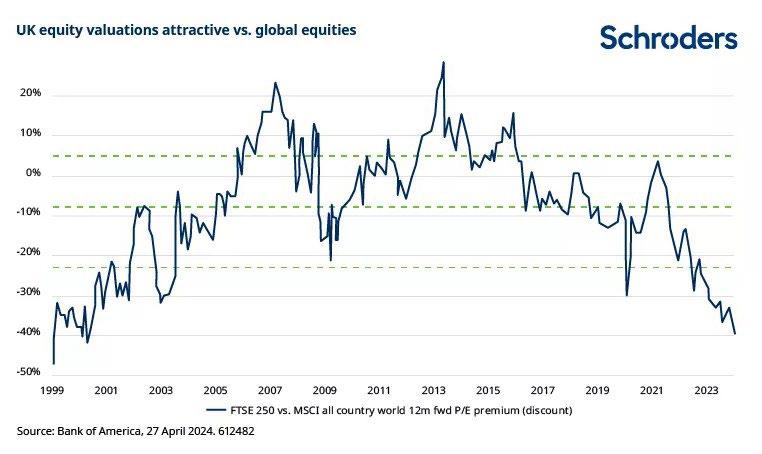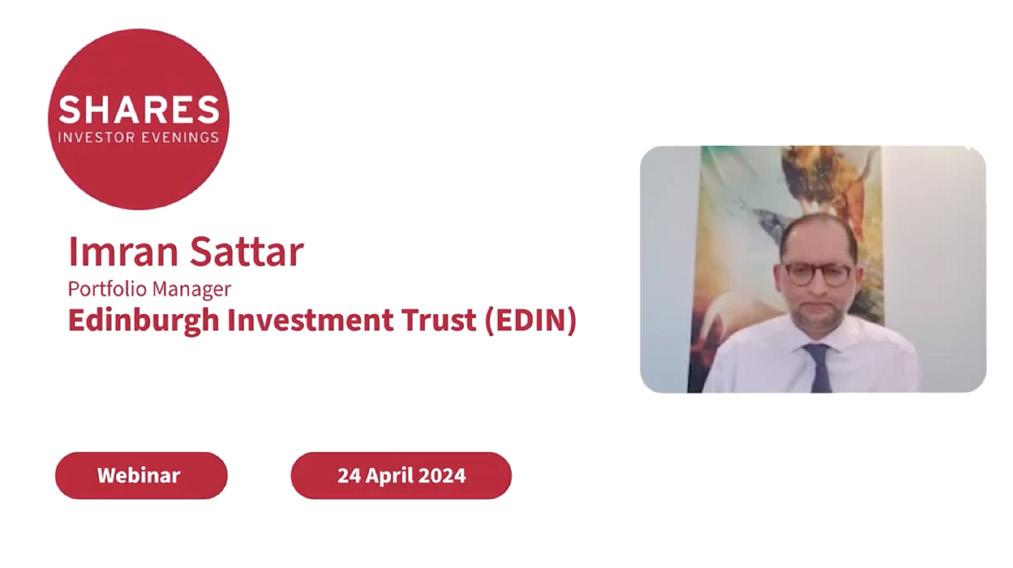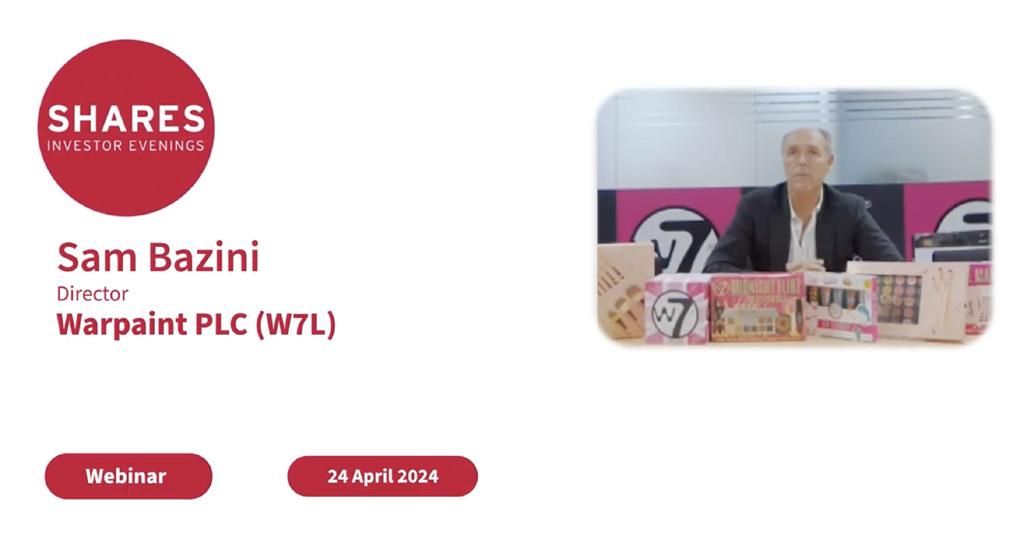What strength in the US currency means for markets


What strength in the US currency means for markets

Truly global and award-winning, the range is supported by expert portfolio managers, regional research teams and on-the - ground professionals with local connections
With over 450 investment professionals across the globe, we believe this gives us stronger insights across the markets in which we invest This is key in helping each trust identify local trends and invest with the conviction needed to generate long-term outperformance
Fidelity’s range of investment trusts :
• Fidelity Asian Values PLC
• Fidelity China Special Situations PLC
• Fidelity Emerging Markets Limited
• Fidelity European Trust PLC
• Fidelity Japan Trust PLC
• Fidelity Special Values PLC
The value of investments can go down as well as up and you may not get back the amount you invested Overseas investments are subject to currency fluctuations The shares in the investment trusts are listed on the London Stock Exchange and their price is affected by supply and demand
The investment trusts can gain additional exposure to the market, known as gearing, potentially increasing volatility. Investments in emerging markets can more volatile that other more developed markets Tax treatment depends on individual circumstances and all tax rules may change in the future
To find out more, scan the QR code, go to fidelity.co.uk/its or speak to your adviser.



How to benefit from the enduring strength of ‘King Dollar’
We look at what a strong US currency means for world markets and suggest ways to play the theme through a tracker fund and two high-quality stocks.
Exploring the phenomenon of compounding
The ability to earn a return on earned income as well as capital means you can let your money work for you and watch it grow.
Did you know that we publish daily news stories on our website as bonus content? These articles do not appear in the magazine so make sure you keep abreast of market activities by visiting our website on a regular basis.
Over the past week we’ve written a variety of news stories online that do not appear in this magazine, including:


How to switch to an income fund in retirement
Shares offers tips on what to do when you decide you want to draw down an income instead of reinvesting your dividends.



Following Patria Investments’ acquisition of abrdn’s Private Equity Europe business, APEO will now be called the Patria Private Equity Trust (PPET).
Whilst the name has changed, the Trust’s management, strategy, and European focus will all remain the same – as will the investment objective. The Trust remains committed to investing for consistent, long-term returns and providing access to private equity for all.
We’re excited for the next stage of our journey, and what Patria’s ambitious involvement will bring us: new resources, new opportunities, and a renewed drive to deliver even more for our investors.
Past performance is not a guide to future results. The value of investments and the income from them can fall and investors may get back less than the amount invested.
Find out more about PPET at patriaprivateequitytrust.com
Move is part of a strategy to restore confidence among consumers and investors
In the latest twist in China’s long, drawnout property crisis, which has seen giant developers such as Evergrande (3333:HKG) and Country Garden (2007:HKG) fall into liquidation, Beijing has relaxed mortgage rules and urged local councils to buy up unsold homes in order to bolster consumer confidence.
The government has removed the nationwide mortgage rate floor for individual buyers of first and second-home purchases and lowered the size of down-payments, while putting up 300 billion yuan (roughly $40 billion) of central bank funding to help state-backed firms to buy unsold properties from builders.
The moves are aimed at reviving sentiment among wealthier Chinese individuals who in the past typically invested their savings in property as a ‘store of value’ rather than funding pensions or investing in stocks after prices seemed to keep rising year after year.
At one stage the property market accounted for a quarter of China’s GDP (gross domestic product), and such was the strength of demand many homes were sold before the developers could build them.
While the announcement last week sent the Chinese property sector index up 10%, adding to its sharp rebound over the last couple of months, according to many analysts the support measures and the funding package are a long way short of what is required to rejuvenate the market.
The fall-out in the sector hasn’t just affected those who bought homes or were looking to buy homes, it has had a huge impact in terms of the number of people employed in the property sector.

between 2021 and 2023 around 500,000 people were laid off, not including those employed in the wider construction industry.
Many of these people are young workers in their prime, who are now struggling to find jobs as China’s youth unemployment rate hits 15%.
This has had a knock-on effect on consumption, which the government has sought to build into the primary driver of the economy as it faces increasing tariffs from the US on its exports.

Meanwhile, the country is launching a charm offensive aimed at global investors with regulators and executives from more than a dozen companies hosting meetings later this week in London and Paris in an attempt to garner foreign interest in the stock market after three years of losses for the benchmark.
According to a local real estate research firm,
Since its January low the MSCI China Index has rallied 32% as the authorities stepped up their efforts to put a floor under the market, and according to the latest Bank of America monthly survey global money managers have been reducing their underweight positions in Chinese stocks. [IC]

News last week that EasyJet’s (EZJ) chief executive of seven years Johan Lundgren was to step down in early 2025 clearly rattled investors, sending the budget airline’s shares down more than 5% on the day.
Lundgren’s decision to fly the coop was all the more surprising given it came the same day the budget carrier reported a 22% increase in total revenue to £3.26 billion and a 17% increase in passenger revenue to £2.04 billion for the six months ending 31 March 2024.
Amidst the market chatter it was suggested Lundgren’s departure could be a sign of more turbulent times to come for the airline industry.
strong, with UK customers willing to suck up inflated ticket prices and added fees – despite the cost-of-living crisis - to get away from the dreary weather at home, but the skies appear to be darkening for the sector.
While EasyJet rival Ryanair (RYA) this week reported record passenger numbers and profits for the full year after hiking fares by 20%, on a call with analysts the company said it may be forced to cut prices more than expected this summer to fill flights.

So far consumer demand for travel remains
‘There’s a little consumer resistance out there and most airlines are engaged in price promotion through April, May and June’, said chief executive Michael O’Leary. Ryanair also said its expansion plans had been hampered by delays to the delivery of new aircraft Boeing (NYSE:BA) which have left it short of some 23 737s due to be delivered by the end of July.
This delay could have a knock-on effect on traffic growth next year, hinted O’Leary.
Delivery aside, aerospace giant Boeing has come under scrutiny for aircraft safety after a panel on one of its 737 Max jets operated by Air Alaska blew out in mid-air in January this year, causing the FAA to ground 171 similar aircraft.
In March of this year, an American Airlines Boeing 777 had to make an emergency landing at Los Angeles International Airport after reporting a ‘mechanical problem’.
Meanwhile, ongoing geopolitical tensions in the Middle East and the Russia-Ukraine war could continue to have an adverse impact on fuel costs, while strikes at air traffic control centres and airports are causing further disruption to flights.
Last year, Europe suffered 67 days of air traffic control strikes causing thousands of flight cancellations, and this year baggage handlers, catering staff and border force staff have already staged walk-outs over pay and conditions. [SG]
Keywords’ scale and breadth convey certain competitive advantages
Neglected, unloved, UK-listed companies are increasingly attracting overseas takeover interest.
Rather like the proverbial 29 bus, from a dearth of bid interest a few months ago there has been a flurry of activity in recent weeks. Data from Dealogic shows the value of UK takeover bids in 2024 is $78 billion and running at the highest pace since 2018.
The latest deal (20 May) sees Keywords Studios (KWS:AIM) in advanced talks with Swedish private equity firm EQT in an all-cash transaction valuing the global video game services provider at £2.2 billion.
News of a potential bid shouldn’t come as a surprise to Shares’ readers after we identified the outsourcing specialist’s depressed share price and undeserved PE de-rating as an attractive buying opportunity in September 2023.
Keywords’ management finally broke cover after EQT made a fifth unsolicited approach pitched at £25.50 per share which the board said represented a ‘significant’ increase on the initial proposal.
The price represents a 73% premium over the prior closing price and led to a 60% jump in the shares on the day of the announcement.
At the current juncture the board is advising shareholders to hold tight as EQT completes due diligence, while the directors said they were minded to recommend the offer.
Keywords Studios
Shares magazine • Source: LSEG
growth plans which continues to be a mix of organic-led expansion augmented by acquisitions. Acquisitions have been a key driver of growth, with Keywords spending around €600 million over the years to gain access to a wide range of niche skills as well as broaden its geographical spread. This has brought the company significant crossselling opportunities and insight into client needs.

Under stock exchange rules, EQT which is one of Europe’s largest private equity managers with €242 billion in assets under management, has until 15 June to make a formal offer.
The company said it remains confident in its
The company’s services include localisation of content which helps game makers launch into multiple markets and languages simultaneously. Keywords also provides its services to the film and television industries.
Despite having a market share of just under 6%, Keywords is more than three times the size of its nearest competitor, according to Numis, making it the largest outsourcing gaming platform in the world.
Since listing on AIM in July 2013, Keywords Studios’ shares have increased 19-fold, equivalent to a compound annualised growth rate of 30% a year, making it one of the most successful firms to list on the UK stock market. [MG]
Shares in Future (FUTR) have been doing rather well since April after the publishing firm hailed a ‘return to organic growth’ in the second quarter.
Over the past month shares are up 56%, and last week they leapt 22% to within a whisker of their 12-month highs.
In a trading statement for the half ended in March, the firm said its return to growth was driven by a strong performance from price comparison site Go.Compare, which posted a 30% jump in revenue,
good growth in B2B and a ‘resilient’ performance in magazines.
The publishing firm took the opportunity while announcing its interim results to launch another £45 million share buyback programme, after having returned just under £36 million to shareholders since last August.
The Country Life and Marie Claire publisher also said it planned to invest between £25 million and £30 million over the next two years to make the business ‘more agile’ and ‘less complex.’
The group reported a 3% fall in statutory revenue to £391.1 million for the six months ending 31 March and a 30% fall in pre-tax profit, but
Entain (ENT) has seen its shares halve over the last year and recently plumb new 12-month lows just as the FTSE 100 is hitting new highs.
This poor showing reflects a combination of factors including weak operational performance, regulatory headwinds and a lack of leadership, with the company looking for its fourth chief executive in as many years.
The group’s troubles have attracted activist investors including Eminence Capital which gained a board seat in January. This prompted a strategic review of the group’s structure, which led to rumours of
private equity interest in a potential break-up of the group.
Last month, The Times suggested one suitor could be CVC Capital, which formerly owned Sky Bet and is the majority owner of German bookmaker Tipico.
Another factor stirring up speculation is the announcement last month that chairman Barry Gibson intends to step down in September.
Gibson blocked bids for Entain from two US firms, MGM Resorts International (MGM:NYSE) and fantasy sports betting company Draftkings (DKNG:NASDAQ), at £13.83 and £28 respectively in 2021,

although the environment remains challenging for the publishing firm, analysts at Shore Capital are convinced by the firm’s target of accelerated revenue growth and an improving margin over the next three years. [SG]

both a far cry from today’s share price.
Current interim chief executive Stella David will replace Gibson once a permanent CEO is appointed to replace Jette Nygaard-Anderson, who abruptly resigned last December. The resignation followed Entain’s £585.5 million settlement of a Crown Prosecution Case relating to historic activities in Turkey undertaken by prior management. [MG]
FIRST-HALF RESULTS
18 May: Victorian Plumbing
FULL-YEAR RESULTS
24 May: Volvere
28 May: Griffin Mining
29 May: Pets at Home
30 May: Auto Trader TRADING ANNOUNCEMENTS
24 May: Intertek
28 May: Impax Asset Management

ARPR growth and Deal Builder progress will be in focus when the automotive marketplace reports
It has been a fair while since investors last heard from Auto Trader (AUTO), the UK’s biggest digital automotive marketplace that allows users to buy and sell a range of vehicles.
Steered by chief executive Nathan Coe, the FTSE 100 constituent motored in with forecast-beating firsthalf results back in November, with outperformance driven by the core business with both ARPR (average revenue per retailer) and customer numbers topping analysts’ estimates.
Auto Trader also issued a confident outlook for the second half, so expectations are high heading into the print. And with the shares up 70% from their pandemic lows, there is scant room for disappointment when this highly-profitable company delivers results for the year to March 2024 on 30 May.
Investors will be hanging on management’s pronouncements when it comes to the competitive landscape - the bulls believe Auto Trader has a moat wide enough to keep an array of rivals ranging from GumTree and eBay to Google at bay - as well as the health of the

UK car market and Auto Trader’s retailer customer base at a time when the market is shifting towards electric vehicles.
Analysts will also be interested in the progress made in scaling Deal Builder, Auto Trader’s service which allows car buyers to value their part-exchange, apply for finance and reserve their chosen vehicle online. [JC]

Peer Walmart has set a high bar with both stocks trading at all-time highs
When discount retailer Costco Wholesale (COST:NASDAQ) files its third-quarter earnings report next Thursday, 30 May, there is likely to be a great deal of interest in what the company has to say about consumer spending habits.
Larger rival and retail bellwether Walmart (WMT:NYSE) reported its latest earnings last week, and revealed the increasing strain on low-income American households making less than $35,000 per year.
However, it also reported a growing number of higher-income households earning over $100,000 visiting its stores to ‘trade down’ and take advantage of low prices on big-ticket items, allowing it to raise
its full-year forecast sending its shares up 7% to a new all-time high.
Costco has always been seen as a safe haven for savvy shoppers due its competitive prices and bulk-buy offers, but in recent months it has raised prices on some of its most popular lines and there is talk of it raising gasoline prices and even its membership fees.
Thankfully the warehouse retailer’s famous $1.50 hot dog and soda offer, a fixture of its food halls for the past 40 years, looks safe for the time being, but with its shares also trading at all-time highs the firm will need to reassure investors it isn’t about to see a decline in customers or revenues. [IC]
QUARTERLY RESULTS
29 May: Agilent Technologies, HP, Salesforce
30 May: Best Buy, CooperCompanies, Costco, Dollar General, Hormel Foods, Lululemon Athletica, Marvell, MongoDB, NetApp, Ulta Beauty, Zscaler




The cash-rich fishing tackle retailer is consolidating the UK market whilst scaling up in Europe
Angling Direct (ANG:AIM) 36p
Market cap: £27.8 million
Risk-tolerant investors looking to net a stock market minnow with exciting growth potential at home and abroad and scope for a margin recovery-driven re-rating should reel in Angling Direct (ANG:AIM).
The resilient specialist fishing tackle retailer is the clear market leader in the UK, where it is profitable and cash-generative from a repeat customer base of anglers, and boasts exciting long-run potential in the much bigger and fragmented European market.
Net cash of £15.8 million represents almost 60% of Angling Direct’s current market cap, providing the company with the funds to drive growth and investors with downside protection should consumer headwinds fail to abate or sub-optimal weather impacts earnings progress.
Singer Capital Markets’ 51p price target implies 40% upside, although investors should note the
Angling Direct
wide bid-ask spread on what is an iliquid micro cap stock.
Results for the year ended 31 January 2024 were encouraging, showing a 126% surge in pre-tax profits to £1.5 million on group revenue up 10.2%
Shares magazine • Source: Angling Direct, Singer Capital Markets
to £81.7 million.
The revenue haul included record UK sales of £77.4 million with the Norfolk-headquartered firm’s growth strategy re-accelerating under new chief executive Steve Crowe’s leadership and the business continuing to take market share, now estimated at 14%.
Retail store sales increased 7.6% through a combination of new openings and resilient organic growth, while UK online sales increased by 11.1% helped by engagement benefits from the company’s loyalty and membership initiatives including the MyAD Fishing Club app.
Angling Direct, which sells over 25,000 fishing tackle products from industry-leading brands alongside its own brands ‘Advanta’ and ‘Discover’, is scaling up and reducing losses in Europe, a competitive market which could be a big long-term prize for the company.
Online sales increased 36.3% to £4.3 million last year with the key territories of Germany, France and Holland growing by 40%, and post year-end Angling Direct successfully opened its first store in Holland (Utrecht) in time for the spring fishing season.
An additional positive was the 10 basis point uplift in gross margin to 34.9%, helped by improved supplier terms, the outperformance of Advanta and Discover, not to mention a boost from new revenue streams including reel spooling services and commercial marketing, all of which offset increased levels of store theft, a trend that most of the retail industry is reeling from in the current cost-of-living crisis.
Crowe has set out some exciting new mediumterm objectives for his charge: through multichannel growth, and faster UK store expansion helped by a new smaller store format, UK sales are expected to grow to over £100 million and EBITDA (earnings before interest, tax, depreciation and amortisation) to north of £6 million over the next three to five years.
Europe is also expected to break-even, albeit this is a slightly longer timeline than previously envisaged with management taking a prudent approach to continental expansion. Angling Direct will also deploy surplus capital to accelerate growth beyond these targets, including on selective acquisitions.
Angling Direct continues to showcase its resilience with total sales rising 4% in the first quarter ended April 2024, a traditional quiet offseason period, with growth delivered in the UK and on the continent despite well-documented adverse weather conditions.
McEachran forecasts sales of £89 million and £98.8 million for the years to January 2025 and 2026 respectively, with pre-tax profits estimated to rise to £1.8 million this year ahead of £2.1 million next.
Based on forecast earnings of 2p for full-year 2026, Angling Direct trades on a forward price-toearnings ratio of 18, although the multiple drops to the single digits on an ‘ex-cash’ basis, which suggests the shares are a catch. [JC]


Costain (COST) 82.4p
Market cap: £225 million
Gain to date: 50.9%
As we said in August last year when we recommended FTSE 250 engineering and infrastructure group Costain (COST), it’s not often we come across companies on single-digit multiples of earnings with large cash piles, and our bet has paid off nicely.
Many will argue the shares are still cheap, and we wouldn’t necessarily argue, but we aren’t sure what is going to drive the re-rating further and at the end of the day Costain is a low-margin business with limited growth potential.
WE SAID
The firm posted a 6% drop in revenue for 2023 but said its order book swelled to three times annual turnover and it had ‘an excellent pipeline

of opportunities’ and was driving ‘high levels of tendering activity’.
Earnings per share were up 23%, helped by interest income on its £164 million of net cash, and the company returned to the dividend list with a total payout of 1.2p per share.
The operating margin rose from 2% to 3%, and analysts are hopeful it could approach 4% this year, but we can’t get excited about a business which is probably making a better return on its cash than it is from its operations.
As we flagged last year, analysts at Liberum had a price target of 80p, which has now been reached, but given its large cash pile and its steady cash flow generation the firm must surely be on the radar of rivals or private equity so we certainly can’t rule out a bid at a premium to today’s price.
However, given the fact the shares have gone up 50% while adjusted earnings per share have risen less than half that amount, and the forecast for next year is for growth to slow to half last year’s rate, we feel the time is right to count our blessings, cash in and move on. [IC]

What
This article explores the macroeconomic ramifications of a strong US dollar and highlights some investments which stand to benefit from the trend.
The dollar is the world’s reserve currency used in almost 90% of foreign exchange transactions, while more than 65 countries peg their currency to the US dollar.
Its strength is being driven mainly by anticipation of widening interest rate differentials as economic performance across the major regions diverge.
The US economy continues to confound the sceptics, showing remarkable resilience in the face of tight monetary policy via higher interest rates. This contrasts sharply with other regions like Europe and the UK which are showing signs of economic weakness which may lead to interest rate cuts sooner than in the US and put further upward pressure on the dollar.
A potential canary in the coal mine in this regard is Sweden’s Riksbank, which surprised the market by cutting official interest rates on 8 May, the first time it has done so since 2016.
A key reason for the Riksbank’s move is the
interest rate sensitivity of the Swedish economy which has high levels of mortgage debt on floating rates. This means the impact from higher rates is felt relatively quickly.
The following section explores some of the wider effects of dollar strength on other economies.
The Japanese authorities are becoming concerned by the weakness of the yen against the dollar, which tested a 30-year low on 30 April prompting talk of intervention by the Japanese MOF (Ministry of Finance) to defend the currency.
It might seem an odd thing to worry about given a weaker yen increases the competitiveness of Japanese goods sold in the US. The answer lies in the fact Japan imports most of its energy and raw materials, which are priced in dollars, to manufacture the goods it then exports.
Not only does this potentially impact profit margins at Japanese companies, but a weak yen also increases inflationary pressures in the wider economy. For many years Japan had maintained a negative interest rate policy to minimise the pain from higher interest costs on the nation’s large debts.
At the time of writing there has been no official announcement confirming foreign exchange intervention at the ¥160-dollar level, but the yen has since strengthened a few percentage points. Intervention involves using foreign exchange reserves to sell dollars and buy yen.
Japan is a special case in the sense that yen weakness has been driven, in part, by financial institutions exploiting the carry trade. This involves borrowing at a low interest rate to invest in an asset that provides a higher interest rate.
For example, until recently investors could borrow in yen at virtually zero and invest the proceeds in US Treasuries paying over 4%. There are trading fees and other costs to consider, but what is left over is profit.
The carry trade is a high-risk strategy because foreign exchange losses can quickly wipe out the interest rate spread, as investors selling yen at ¥160 to buy dollars have no doubt discovered.
Historically, unilateral currency intervention has not had a lasting effect on medium-term exchange rates. The last time there was co-ordinated intervention by central banks was in the 1980s when a strong dollar last caused a headache for nations outside the US.
Further signs of stress related to the strength of the dollar include Indonesia’s surprise quarter of a percentage point hike in rates to 6.25% on 24 April to strengthen the rupia, and comments from Korean officials citing continued strength of the dollar against the Korean won.
Korea is Asia’s fourth-largest economy and a big exporter but like Japan it is also heavily dependent on importing raw materials which are priced in dollars.
A similar story is repeating itself across other emerging economies in Latin America and Africa. It
is the speed of the dollar’s ascent against emerging currencies which is causing the angst.
Even large companies are feeling the pinch. Electronics giant Samsung Electronics (005930:KRX) was not expecting the won to fall so much according to Lee Sang-Ho, vice president at the Federation of Korean Industries, a lobby group representing the country’s biggest companies.
Adding to the cost of higher imports, companies which have borrowed money in US dollars are also feeling the pain of higher debt servicing costs, although some of the impact can be mitigated through currency hedging.
FTSE index heavyweights in the mining and energy sectors are very sensitive to currency movements given the products they sell are almost exclusively priced in dollars.
When BP (BP.) reports its earnings in dollars they are worth a lot more to a sterling investor when the exchange rate is $1.24 than when it is $1.95 to the pound.
Investors electing to receive BP’s dividends in sterling will see a translational benefit from a stronger dollar, and because the shares are priced in pence the translational effect will inflate sterling earnings per share and reduce the price to earnings multiple, although overall the effects are small.
A similar benefit happens when a UK company priced in pence conducts a share buyback with cash flows generated in US dollars.
The UK’s largest companies may have their shares listed on the London Stock Exchange, but most are global businesses with significant operations outside the UK.
Schroder Investment Management estimates around 71% of the combined earnings of companies in the FTSE 100 index are generated overseas.

Large multinational companies listed in the US are seeing the opposite effect from a strong dollar. Companies such as Coca-Cola Co (KO:NYSE) and McDonalds (MCD:NYSE) have bemoaned the negative translational effects on their overseas earnings over the past few quarters.
Several UK companies with a significant US presence have moved their reporting currency to dollars, including equipment hire group Ashtead (AHT) which generates around 85% of its revenue stateside.
In addition to translational effects there are operational or transactional effects. These happen where there is a currency mismatch between revenue and costs or assets and liabilities.
A good example is polymer manufacturer Victrex (VCT) which exports more than 98% of its products and imports raw materials from overseas.
The company does not disclose the proportion of total costs incurred in the UK although it provides a sensitivity table outlining the effect of a change in the pound/dollar on its profits in the annual report.
A 5% change in the pound/dollar exchange rate is estimated to affect profit by £2.7 million which equates to around 4.4% of earnings. This means a 15% increase in the dollar versus sterling could potentially increase profit by around 13% (or reduce profit if the pound is strong).
Victrex actively hedges between 75% and 100% of its projected transaction exposures 12-months forward. This reduces the maximum negative impact of a strong pound scenario.
Due to its sector composition, the FTSE 100 index is one of the most sensitive indices to movements in the dollar making it an effective way to capture the benefits of dollar strength.
There are other potential benefits too. The UK market is trading at 50-year lows relative to the MSCI World Index and has the highest total yield globally according to Redwheel fund managers Ian Lance and Nick Purves.
Total yield is defined as the combined dividend yield plus share buyback yield. The UK offers a 6% yield, double the equivalent yield offered by the US according to analysts at Morgan Stanley.
There are several ETFs which efficiently track the FTSE 100 index for a low cost. The largest and cheapest is the iShares Core FTSE 100 ETF (ISF) which has over £24 billion of assets and a total expense ratio of 0.07% per year.
A more direct way to get exposure to continued dollar strength is via the Amundi Fed Funds US Dollar Cash ETF (FEDG) which tracks short-term money market interest rates in the US.
In effect, investors can capture both a higher rate of interest available on US money markets and any future appreciation of the dollar against the pound. This $223 million fund has a total expense ratio of 0.1% a year.
The Shares team has selected two UK companies which it believes are fundamentally attractive and stand to benefit from dollar strength.
Market Cap: £64.9 billion
Anglo-Dutch information services company Relx (REL) generates around 60% of group revenue in dollars while only 40% of its employees are based in the US.
A strong dollar and weak pound boost the group’s US earnings when translated back into sterling-based EPS (earnings per share) and DPS (dividends per share).
Relx is a high-quality, high-return business characterised by strong recurring revenue generated though the firm’s subscription-based model.
An underappreciated aspect of the business is its potential to exploit generative AI (artificial intelligence) to analyse large datasets for its clients. The company has been investing in innovation around data analytics and AI for several years which is helping to reinforce an already strong competitive position.
The most advanced use of AI is probably in the legal division where its market leading Lexis +AI is helping lawyers to digest complex legal content and generate value-added analysis.
Meanwhile, the company’s science division gives clients access to the world’s largest platform dedicated to peer-reviewed primary scientific and medical research.
Relx continues to develop and incorporate content and value-added analytics driven by deeper insights gained through AI, which has the potential to open up new growth avenues and potentially gives the firm stronger pricing power. [MG]
Market cap: £186.2 million
Another big dollar earner is IG Design (IGR:AIM), whose shares have rallied strongly over the past year but remain well below their pre-Covid peak.
The maker of everything from gift wrap and greetings cards to Christmas crackers and creative play products remains at the start of its turnaround journey under a new management team led by chief executive Pal Bal.
The fact over two-thirds of the company’s sales are now generated in the US, a legacy from unintegrated acquisitions across the pond made under previous management, should be positive for its shares which are priced in sterling, even though the company reports in dollars.
Bal is spearheading a new growth strategy centred on ‘winning with the winners’, which includes blue-chip retail customers such as Tesco (TSCO), Walmart (WMT:NYSE), Costco (COST:NASDAQ) and Dutch value chain Action, while at the same time pulling self-help levers to boost margins, simplify the business and drive greater supply chain resilience.
With a 345p price target, implying 70% upside, Liberum Capital points out IG Design’s cash pile is ‘already ahead of expectations, so surplus returns to shareholders could be the surprise over the next 12 months’. [JC]
The FTSE 100 may be scaling new all-time highs, but unlike in Japan, where the Nikkei 225 recently achieved the same feat, few commentators are talking about a turning point. The UK equity market remains in a sorry state if you believe the headlines.
With sentiment so low though, contrarian investors might argue things can only get better. Legendary investor Warren Buffett once remarked that it’s wise for investors to “be fearful when others are greedy and greedy when others are fearful”.
As ever, Buffett has been busy eating his own cooking. He invested heavily in Japanese stocks a few years ago when many commentators were writing off the stock market. And he’s been rewarded handsomely for it.
The Nikkei 225 – which tracks Japan’s largest companies – is the best performing major index yearto-date (at least in local currency terms). Could UK equities be at a similar position to where Japanese ones were two years ago, and about to take off?
Equity investing always carries risks and trying to time shifts in markets is far from being an exact science. That said, here are four contrarian indicators which underline how bad sentiment has become, and so how large the potential opportunity might be.

A dearth of new companies coming to the market, or initial public offerings (IPOs) may not be helping the mood of investment bankers given the lack of juicy fees.
History clearly shows, however, that increased UK IPO activity typically corresponds with a short-term peak in the equity market – witness the high levels of IPO activity in 2008 and 2021, compared with current depressed levels.



CONTRARIAN INDICATOR #2 – LOW VALUATIONS RIGHT ACROSS THE MARKET
Valuations are also extremely attractive across the entire size spectrum of UK companies (see chart, below).
Hence the pick-up in “incoming” bids from overseas competitors and private equity acquirers for FTSE 100 and small and mid-size companies, such as constituents of the FTSE 250 index.
Foreign bidders are clearly seeing the opportunity to secure attractive assets and market positions at knockdown prices.
CONTRARIAN INDICATOR #3 – ROCK-BOTTOM PENSION OWNERSHIP
Domestic pension funds are increasingly mature and have reduced allocations to volatile equities in an effort to better manage their liabilities.
Data from the UK’s Office for National Statistics shows that domestic pension funds now own just 1.6% of the UK equity market compared with around 33%
back in the 1990s.
Meanwhile, the Capital Market Industry Taskforce, a cross industry group looking at ways to reform the UK equity market, estimates the domestic equity allocation is 2.8% (see table, below).
On either measure, domestic ownership is low relative to other territories.
Nobody has a crystal ball regarding exact timing, but it’s hard to see that domestic pension funds can significantly further reduce their exposure to UK equities.
And what’s to stop a new government from mandating a certain minimum level of UK equity exposure within pension portfolios, following on from the current administration’s belated and rather halfhearted announcement of a British ISA?
It seems that something needs to be done to encourage long-term investment in UK-listed companies.
If action is taken at some point, we may see increased demand at a time of limited supply (see

contrarian indicator #4, below). This would be good for asset prices and hence returns for patient UK equity investors. Time to be greedy.
Let’s not forget either that demand from private UK investors is hardly sky-high either.
Many of those individuals who got rich on the back of “Tell Sid” privatisations and demutualisation of building societies between the 1980s and early noughties switched their allegiance to technologyheavy equity markets overseas.
We’re constantly asking ourselves what might cause them to reappraise these allocations.
CONTRARIAN INDICATOR #4 – SHRINKING
On the issue of supply, more confident management teams are buying back shares at a very rapid clip (see chart, below).

This communication is marketing material. The views and opinions contained herein are those of the named author(s) on this page, and may not necessarily represent views expressed or reflected in other Schroders communications, strategies or funds.
This document is intended to be for information purposes only and it is not intended as promotional material in any respect. The material is not intended as an offer or solicitation for the purchase or sale of any financial instrument. The material is not intended to provide, and should not be relied on for, accounting, legal or tax advice, or investment recommendations. Information herein is believed to be reliable but Schroder Investment Management Ltd (Schroders) does not warrant its completeness or accuracy.
The data has been sourced by Schroders and should be independently verified before further publication or use. No responsibility can be accepted for error of fact or opinion. This does not exclude or restrict any duty or liability that Schroders has to its customers under the Financial Services and Markets Act 2000 (as
Additionally, some UK companies are looking to relist their shares in the US (attracted by a potentially bigger pool of capital and higher valuations), and that’s not even mentioning those companies set to be lost to bids.
Again, less supply when demand may be set to increase – it may be time to get greedy.
Schroders boasts two UK equity investment trusts for those interested in the market’s current appeals.
The Schroder Income Growth Fund plc looks across the entire UK market cap spectrum for opportunities, blending dividends from different parts of the market with the aim of achieving income growth in excess of inflation and capital growth as a result of that rising income.
Alternatively, the Schroder UK Mid Cap Fund plc, aiming to outperform the FTSE 250 ex Investment Trusts index, provides access specifically to mid-sized UK companies in an area of the market regarded as a sweet spot for innovation, disruption and growth.
amended from time to time) or any other regulatory system. Reliance should not be placed on the views and information in the document when taking individual investment and/or strategic decisions.
Past Performance is not a guide to future performance. The value of investments and the income from them may go down as well as up and investors may not get back the amounts originally invested. Exchange rate changes may cause the value of any overseas investments to rise or fall.
Any sectors, securities, regions or countries shown above are for illustrative purposes only and are not to be considered a recommendation to buy or sell.
The forecasts included should not be relied upon, are not guaranteed and are provided only as at the date of issue. Our forecasts are based on our own assumptions which may change. Forecasts and assumptions may be affected by external economic or other factors.
Issued by Schroder Unit Trusts Limited, 1 London Wall Place, London EC2Y 5AU. Registered Number 4191730 England. Authorised and regulated by the Financial Conduct Authority.

Investing small, regular amounts can add up to an enormous difference with time on your side
Readers with teenage children or young adult kids may be familiar with the following complaints. They’ll be the first generation ever that will be poorer than their parents and grandparents. They are so priced out of home ownership that it isn’t even something they think about.
Jobs are far less secure than in the past with none of the defined pension benefits that mum or dad got, while free public services once taken for granted may not remain so down the line. This makes their futures far more uncertain than generations of the past. And soon, these economically disadvantaged youngsters will also be outnumbered by their elders, presuming the demographic tides keep tilting as they are now.
Whatever criticisms might be batted back against Millennials or iGens (a termed coined by psychologist Jean Twenge to describe those born after 1995 for their ubiquitous use of iPhones) – workshy, unambitious, self-obsessed – most would accept that there is at least a nub of truth in youngsters’ grievances.
Yet they have one crucial advantage - time. And this matters when investing for your future like little else thanks to the power of compounding, that mathematical marvel which Einstein called ‘the eighth wonder of the world’.
Compounding is the process by which an investment’s returns, either from capital gains, income, or both, are reinvested to generate additional returns over time. ‘It’s like a snowball being rolled down a hill: it starts off small with not much extra snow added, but the bigger it gets the more snow it gathers’, says Charles Stanley chief analyst Rob Morgan.
A (withdraws gains each year)
B (reinvests gains)

‘The further the snowball goes the more powerful the effect, which is why time plays such a big factor in compounding.’
Let’s illustrate this with a simple example. Let’s say you invest £100 at a 10% annual return. After one year, you now have £110. Which means next year’s 10% return is earned on £110, becoming £121, year three’s 10% is earned on £121, so becomes £131.10, year four becomes £146.41, then £161.05 after year five.
That annualised five-year return works out at 12.2%, 2.2 percentage points better than the 10% a year at which you have been investing over the five years.
‘Money makes money. And the money that money makes, makes money’, said Benjamin Franklin, capturing the allure of compounding returns perfectly.
In real life, you are unlikely to get 10% returns every year on any investment - average stock market
returns, according to Barclays’ Equity Gilt Study, are more like 5% to 6% based on decades of return data from all over the world.
And while stocks have historically been one of the best performing asset classes, the returns they provide can be volatile, with smaller and larger annual returns sprinkled with other years of losses. But this is why compounding returns are so valuable to investors, says Coutts chief investment officer Alan Higgins.
What’s striking with the compounding effect is how patiently accruing modest returns can lead to excellent long-term results.
‘Over time, compounding your returns by simply leaving them invested could help you ride through any market volatility’, Higgins says. Time in the market, not timing the market, as they say, and that means you could end up with a pension pot worth far more than you put in.
So, while you won’t see the benefits of compound returns overnight, building slowly and taking a long-term investing approach
Shares magazine • Source: Shares magazine
really matters. And just because you don’t have thousands of pounds to invest need not stop you getting that ball rolling.
As our data shows, even relatively small sums invested regularly over years can build up into a large pot. And you wouldn’t expect your salary to stay the same in future, so increasing your contributions as your earnings improve can really soup up the long-term outcome.
What you want to avoid to is reaching too far to quickly for higher returns which can make you come unstuck. Doubling your money in a year would probably involve taking a very high level of risk, most probably casino-like. However, doubling your money over 10 years is much more attainable. You need a return of just over 7% a year.
For example, if you were to invest £5,000 a year into a diversified portfolio with a 5% annual growth rate into your pension from 20 years of age, you would have a portfolio of £838,426 if you were to retire at age 65. Alternatively, if you were to wait until you are 35 to save into your pension
Shares magazine • Source: Shares magazine
based on the same growth rates and with the same retirement date in mind, you would have a retirement pot of just £348,804. Start at 45 and your retirement pot would be down at £173,596. Compounding can make a big difference when it comes to giving your kids a financial leg up. If a family invests £3,000 a year (£250 a month) for their newborn daughter into a diversified equity portfolio, by the time she is 25 they will have invested £75,000 in total. If this portfolio achieves a 5% annual growth rate over this period and all dividends are reinvested, she will receive another £75,340 just from compounding the investment returns. In other words, at age 25 she will have £150,340, a fair chunk to pay off university fees and provide a lump sum for a mortgage.
 By Steven Frazer News Editor
By Steven Frazer News Editor

• Small caps are a vital part of the Asian growth story and inextricably linked to many long-term global trends
• Their appealing growth characteristics and resilient business models are underestimated by investors, in our view
• Allocations to Asia by international investors are at their lowest level in a decade
A number of major growth themes have been dominating global equity markets – from Artificial Intelligence (AI), to the energy transition, to near-shoring. Larger companies have often been seen as the real beneficiaries of these structural growth trends – from the US technology giants to Asian titans such as TSMC and Samsung. In reality, small caps are a vital part of the ecosystem for many of these long-term trends – and yet their growth profile remains underappreciated by investors.
This is particularly evident in AI. To date, the US technology giants have grabbed headlines, along with the well-known European and Asian semiconductor groups. These are great companies, but their growth trajectory is well-understood by markets. Yet there are beneficiaries all the way down the supply chain that have been overlooked by investors. Many are to be found among Asia’s smaller companies, particularly in Taiwan and

There has been a strong recovery in the global technology cycle, with rising demand for semiconductors and technology equipment. TSMC has announced plans to expand its capital expenditure by around 7% in 2024 , which helps feed the whole supply chain. In the abrdn Asia Focus portfolio, we hold companies such as Taiwan Union Corporation and Sunonwealth to capture this trend. Both companies are seeing an acceleration in demand as well as a shift to higher value products, which is driving an improvement in margins. Even though the large cap companies such as TSMC are the key enablers of this growth, the impact on these smaller companies is even more pronounced, making them a more direct play on artificial intelligence.
Near-shoring (or re-shoring, or friend-shoring, or ‘China plus One’)
is a phenomenon whereby global companies diversify their supply chains away from China, with the aim of ensuring continuity and certainty of supply. It is happening across Asia, creating new pockets of growth.
This trend is still in its early stages, but the beneficiaries are already emerging. Vietnam, for example, is seeing a new wave of foreign direct investment, as companies set up manufacturing centres there. This has knock-on effects for the growth of the consumer economy as well. Indonesia is becoming a crucial link in parts of the commodity supply chain. Against this backdrop, we hold companies such as AKR. This is primarily a fuel distribution business, but it has a large industrial estate linked to one of the country’s deep-sea ports that is becoming a large industrial and logistics hub. . As metals and refining businesses expand in Indonesia, the company is well-placed to benefit.
Near-shoring is also an important new driver for the Indian economy. The Indian government is putting incentives in place for industries to set up manufacturing there whilst removing logistics bottlenecks via large investments in infrastructure. The ‘Made in India’ narrative is taking hold, with tangible increases in capacity and rising manufacturing across the country, particularly in areas such as electronics and renewable energy. Healthcare and biotechnology suppliers are also moving to India, with many of the beneficiaries being local smaller companies.

Asia’s consumption story may have taken a pause during Covid, but it remains a long-term growth theme as the region’s middle class grows and spending patterns shift. We are even starting to see some improvement in China, where, until recently, consumer spending has been subdued. The country’s households have had plenty of firepower, but little inclination to spend.
This is changing in selected areas. One of those has been domestic travel. Our portfolio includes a travel platform called Tongcheng Elong that is connected to Tencent’s WeChat app and supported by travel giant Trip.com. We also hold AutoHome, which helps connect car dealers with buyers of cars. It is the leader in its market and, alongside many Chinese companies, remains very cheap. ChaCha Food, which makes nuts and
seeds, is a leader in niche consumer goods and another favoured holding.
These structural growth themes ensure that many of these smaller companies have a longer pathway of growth, and that their destiny is firmly in their own hands. However, they are often overlooked. Asia remains out of favour and allocations to Asia by international investors are at their lowest level in a decade. Across Asia, small and mid-cap companies have performed well but their strength has come from earnings growth, rather than rising valuations. Asia is one of the few regions across the world where small caps have materially outperformed large caps over the past 3-5 years.
It is also worth noting that small caps have some inherent strengths. They can access niche markets, tied
Risk factors you should consider prior to investing:
• The value of investments, and the income from them, can go down as well as up and investors may get back less than the amount invested.
• Past performance is not a guide to future results.
• Investment in the Company may not be appropriate for investors who plan to withdraw their money within 5 years.
• The Company may borrow to finance further investment (gearing). The use of gearing is likely to lead to volatility in the Net Asset Value (NAV) meaning that any movement in the value of the company’s assets will result in a magnified movement in the NAV.
• The Company may accumulate investment positions which represent more than normal trading volumes which may make it difficult to realise investments and may lead to volatility in the market price of the Company’s shares.
• The Company may charge expenses to capital which may erode the capital value of the investment.
• The Company invests in smaller companies which are likely to carry a higher degree of risk than larger companies.
• Movements in exchange rates will impact on both the level of income received and the capital value of your investment.
• There is no guarantee that the market price of the
to domestic and global economic growth, while swerving problematic geopolitics. Just as they have often been over-looked by investors, these companies are generally not in the headlights of policymakers, which gives them greater freedom to grow.
In our view, Asian smaller companies remain a compelling route to access some of the most enduring and exciting themes in the global economy. They generally come without the baggage of larger companies and may provide more concentrated exposure. Most importantly, they come at realistic valuations that may underestimate their long-term growth.
Company/Companies selected for illustrative purposes only to demonstrate the investment management style described herein and not as an investment recommendation or indication of future performance.
Company’s shares will fully reflect their underlying Net Asset Value.
• As with all stock exchange investments the value of the Company’s shares purchased will immediately fall by the difference between the buying and selling prices, the bid-offer spread. If trading volumes fall, the bidoffer spread can widen.
• The Company invests in emerging markets which tend to be more volatile than mature markets and the value of your investment could move sharply up or down.
• Specialist funds which invest in small markets or sectors of industry are likely to be more volatile than more diversified trusts.
• Yields are estimated figures and may fluctuate, there are no guarantees that future dividends will match or exceed historic dividends and certain investors may be subject to further tax on dividends.
Issued by abrdn Fund Managers Limited, registered in England and Wales (740118) at 280 Bishopsgate, London EC2M 4AG. The company is authorised and regulated by the Financial Conduct Authority in the UK.
Find out more at http://www.asia-focus.co.uk/en-gb or by registering for updates You can also follow us on social media: X and LinkedIn
Switching from accumulation to income funds is one way to maintain your lifestyle
Switching an investment portfolio from accumulation to income funds is something investors might consider as they approach retirement.
In this article we explain the difference between the two and the costs and tax liabilities (if any) of switching between the two as investors think about ‘drawing down’ their pension income.
When you are looking at funds on an investment platform, or wherever you go to manage your investments, you might see the abbreviation ‘acc’ or ‘inc’ at the end of a fund name.
The letters ‘acc’ stand for accumulation, while ‘inc’ stands for income. They refer to the two different options for how income is paid to investors.
An accumulation unit automatically reinvests the income into the fund rather than paying it out to you. This is useful if you don’t need a regular income and you want to let your investment continue growing and compounding. It also saves you having to set up an instruction on your account to reinvest the income as it is done for you.
On the other hand, an income unit pays the dividend as cash into your investment account or your bank account. Some funds pay annual or semiannual dividends, while some pay quarterly or even monthly, which can be helpful in paying bills if you don’t want to eat into your capital.
Some funds include ‘acc’ or ‘inc’ as part of their fund title, so it is easy for investors to know which type of units they are buying.
For example, Janus Henderson Global Tech Leaders Acc (0771607) means you are buying the accumulation units, while Polar Capital Global Tech Inc (B42W4J8) means you are buying the income version of the fund.

Ryan Hughes, interim managing director at AJ Bell Investments says: ‘Investors should think about the actual level of income they need and construct their portfolio accordingly i.e., don’t generate a high yield if it isn’t required.
‘Fixed-interest yields are appealing right now so it is possible to generate a good level of income from fixed income, allowing the equity element of a portfolio to be invested for growth.
‘While some may see the absolute level of income as important, actually building in a growing income can be far more powerful given the impact of inflation over time.’
Hughes adds investors don’t necessarily have to switch to an income-producing strategy and income can be taken as either yield or as capital.
Compounding is the process where an investor earns income on top of income. It is the result of reinvesting dividends to generate additional earnings over time – it is a way of earning returns on both your original investment and returns you received previously.
Retirees often use income units to increase their pension payments, but if you don’t need the
cash now accumulation units offer the benefits of compounding.
Whatever you decide, it is important to find out whether you are liable for any transaction charges if you switch from an accumulation fund to an income fund. This will depend on the rules set by the investment platform you use.
If you are switching from the accumulation version of a fund to its income version or vice versa – for example from abrdn Global Equity acc (3168273) to abrdn Global Equity inc (B83WC46) –some platforms like AJ Bell allow you to do this for free if it is the exact same fund.
AJ Bell is unable to switch between different funds, however, even if they are run by the same provider.
In the case of an AJ Bell customer, if they would like to action a switch then all they would need to do is send a secure message from their account outlining which fund they would like to action a switch on, then confirm whether they would like to switch to accumulation or income.
The AJ Bell team will then investigate whether this switch is possible and confirm to the customer when this has been completed or whether there are any issues.
This process can take two to three weeks (endto-end) for daily dealing funds.
If an investor holds a fund in an ISA or pension no income will be taxed, however if an investor holds a fund outside a tax-protected wrapper it may be subject to tax if the gain exceeds the annual capital gains tax allowance for the year.
CHARTERED FINANCIAL PLANNER Lena Patel tells Shares: ‘Many clients do transition their investment portfolios from accumulation to income-focused strategies as they approach retirement. This shift often involves reallocating assets from growthoriented investments to those that provide a steady stream of income.
‘There are several ways investors can generate income in retirement, such as dividend-paying stocks, and fixed income investments are also becoming popular for some clients’ annuities.
‘In my view it depends on the individual’s financial goals, risk tolerance and overall financial situation. Transitioning to income-focused investments can provide stability and regular cash flow during retirement, which is crucial for covering living expenses.
‘However, it is essential to strike a balance between generating income and preserving capital, especially considering the potential impact of inflation and longevity risk.
‘Investors should also diversify their income sources to mitigate risk and ensure their portfolio can withstand market fluctuations. Additionally, seeking professional financial advice can help individuals tailor their investment strategy to their specific needs and objectives as they approach retirement.’
Disclaimer: Financial services company AJ Bell referenced in the article owns Shares magazine. The author of the article (Martin Gamble) and the editor (Ian Conway) own shares in AJ Bell.
 By Sabuhi Gard Investment Writer
By Sabuhi Gard Investment Writer

A
Life as a cash saver is great now interest rates are higher right? Wrong, for a lot of people. While the very best rates available on the market are comfortably beating the rate of inflation, a lot of cash is still languishing in accounts paying miggins in interest, if that.
Bank of England data shows that £253 billion is sitting in bank and building society accounts paying precisely zero interest. This is money which is simply wasting away once the effect of inflation is considered. It would hold as much value stuffed into a mattress, if you could find one that would hold a quarter of a trillion quid.
The amount of money held in accounts paying no interest has been on the rise since the financial crisis, as a result of low interest rates and bank funding schemes introduced by the Bank of England. Between March 2009, when interest rates were cut to the emergency level of 0.5%, and October 2022, this inert cash pile rose from £58 billion to a peak of £272 billion, according to Bank of England data.
Given the dramatic rise in interest rates over the last few years, you might have expected this cash mountain to crumble away. But while it has been trimmed back to ‘only’ £253 billion, there hasn’t been a wholesale sea change. The last time interest
rates were at 5.25% as they are now, in April 2008, there was £33 billion held by households in accounts paying no interest. Even accounting for the increased stock of household savings over that period, that still looks like a phenomenal explosion in this type of account and suggests banks and building societies are making hay with large swathes of savers’ cash.
Even cash held in instant access accounts that do pay interest isn’t providing savers a whole hill of beans in interest. The average rate on cash held in instant access accounts is currently 2.1%, again according to the Bank of England. That’s below the rate of inflation and compares very unfavourably to top savings accounts on the market, which are paying in excess of 5% per annum.
Savers can simply wait for banks and building societies to improve rates on these accounts, but on current form, which looks like it’s going to be a glacial process. For those who want to act themselves to avoid falling into a low interest rate trap, here are five pointers.
1. Keep as little as possible in current accounts. These accounts are transactional and consequently tend to pay very low levels of interest. Make sure you do leave enough in there to cover bills and outgoings though, to stop you dipping into your overdraft and paying interest and fees.
2. Shop around for the best rate. Trusting your high street bank or existing provider to give you the best deal on savings won’t get you very far. Use comparison sites or cash savings hubs to find and compare the best rates available on the market.
3. Don’t forget Cash ISAs. You may not be able to get quite as much in interest from an ISA as the very top savings accounts, but after tax, the protection afforded by the ISA could mean you end up better off. It depends what rate of taxpayer you are and how much interest you have from other sources. That’s because the Personal Savings Allowance allows you to receive a certain level of interest tax-free every year. For basic rate taxpayers this amount
is £1,000, for higher rate taxpayers it’s £500, and for additional rate taxpayers it’s £0. Interest received annually above these levels is taxable and would therefore benefit from being held in a Cash ISA.
4. Consider gilts. DIY investors have been ploughing large sums into short-dated, low coupon gilts recently. These come with a government guarantee of repayment on maturity and much more attractive rates of return now interest rates have risen. The particular appeal though is that capital gains from gilts are tax-free, so if you can identify bonds where almost all the return is coming from capital appreciation rather than an income yield, you pay less income tax. This approach is only for those who understand gilts and are willing to roll up their sleeves to find appropriate bonds.
5. Think about investing. Conventional financial advice is you should have three to six months of expenditure in cash, so if you’ve already got this parked in cash accounts, you should think about investing any excess for the longer term. Data from Barclays shows that over 10 years there is a 91% chance shares will outperform cash.
 By Laith Khalaf AJ Bell Head of Investment Analysis
By Laith Khalaf AJ Bell Head of Investment Analysis




Investors and companies are guilty of focusing too much on tomorrow rather than months or years down the line
The market has a major problem –investors are becoming too short-term in their thinking, which is leading to wild swings in share prices. Moreover, the situation is getting worse and presents a problem for everyone with money in the market including those who take a long-term view.
Being patient and not allowing yourself to be swayed by ‘noise’ is good practice when you are investing money. A financial adviser might say it is best to focus on the long term and fund managers will also follow this path. While that is easy to say, it can be hard to ignore day-to-day share price movements.
It is important to understand why shares are moving in a certain way, particularly if they are falling. Watching your shares go down in value is frustrating, but making investment decisions purely on the basis of short-term price movements can be dangerous. You are at risk of making knee-jerk reactions without any rational analysis.
Online housing rental marketplace Airbnb (ABNB:NASDAQ) is a perfect example of shorttermism at work. The share price fell 7% on 9 May despite the company reporting nearly double the level of earnings expected by analysts for its first quarter. Unfortunately, a weaker outlook for the second quarter gave the market a bite worse than bed bugs.
The reason for the new guidance was the bulk of the Easter weekend fell in March rather than April, effectively pulling forward seasonal demand into Airbnb’s first-quarter reporting period and removing a traditional second-quarter sales catalyst.
Throw in one-off payment processing issues and higher marketing expenses and investors took it to
mean the end of the Airbnb story almost. In reality, this is about one quarter’s performance potentially being weaker than normal.
The stock market is forward-looking and it prices in what it thinks will happen in the future. However, put a single obstacle in the way and investors cannot think beyond the next two or three months. By the time the summer is over, the fallout from the Easter timing issue will be in the rear-view mirror so why is the market fretting so much now?
There is evidence to suggest investors are not the only ones being too short-term in their thinking. In certain cases, management teams have been too

focused on hitting quarterly targets and have not been running their businesses with a sufficiently long-term perspective. That seems to have rubbed off on investors as they increasingly come to judge a company on what it has done over a mere 12-week period.
For example, management teams might have prioritised near-term shareholder interests and short-run profitability over the long-term growth of the firm.
Some companies do everything they can to meet quarterly earnings estimates at the cost of longterm investment. It is easy to trim back spending here and there on research and development, advertising, maintenance and hiring, for example, but what if that means competitors do clever things in the interim and get a step ahead? These rivals might reap the benefit of taking a longer-term view about what is best for their future.
The oil industry is a case in point. The world is shifting to renewable energy but companies like BP (BP.) and Shell (SHEL) are under huge pressure from shareholders to sweat their oil and gas assets and not rush with their energy transition investments. That might keep current earnings sweet, and the buybacks flowing, but isn’t there a risk this short-term thinking will ultimately backfire down the line when they find themselves lagging their competitors in the new green-energy world?
Equity research also places a big emphasis on shortterm performance and that can rub off on investors. Furthermore, the rise of social media has fueled the ‘I want it now’ mentality for information and companies can receive widespread criticism if they fail to hit market expectations at quarterly or halfyearly results.
This creates a vicious circle where other investors start to put more emphasis on quarterly performance because they can see that is how the crowd is judging a company.
Five years ago, the European Securities and Markets Authority (ESMA) started gathering evidence of short-term pressure on corporations from the capital markets. Its report, published in 2020, pinpointed plenty of examples of shorttermism, including remuneration for company executives and fund managers running portfolios
on behalf of investors, which rewarded short-term profit seeking.
The fact chief executives are spending less time in the role before leadership changes also implies short-termism. The mean tenure of chief executives at the world’s largest 2,500 companies declined from around 10 years in 1995 to more like six years in 2009 according to the ESMA study.
Once company bosses get the top job, they do everything they can to grow earnings and make their mark then move on. This means there is a risk they make the wrong decisions simply to show quick results.

It is clear there is not a single solution to these problems. All an investor can do is take a step back, show restraint when they obtain a new piece of information relevant to their portfolio and take the time to weigh up the facts.
A wise man once told me to stop looking at share prices each day. They suggested ‘a sneaky peak once a week’ might suffice, but even that is too often.
When you buy a car you hope it will be roadworthy for years to come, but unless you are a fanatic very few of us would feel the need to look under the bonnet every week.
You may check the oil level or the windscreen fluid every month, but otherwise most people rely on the annual MOT to make sure everything is on track. Maybe more of us should try that approach when it comes to managing our portfolios too.
By Daniel Coatsworth AJ Bell Editor in Chief and Investment Analyst

The sooner you start the better, even if it is only a small amount to begin with
Since the launch of AJ Bell’s Money Matters campaign three years ago, more women have started investing. In the two months around tax year-end over 40% of new customers opening accounts on the platform were women.
That’s not to say there isn’t still a huge amount of ground to make up to narrow that massive gender investment gap.
We know that the number one barrier preventing women from investing is a lack of cash – from the gender pay gap, to taking time out of the workplace to have children or cutting back on hours to help cover childcare requirements, which still predominantly falls to women.
Then there are those caring responsibilities that crop up in later life, from older relatives to helping look after grandchildren.
And if all that weren’t enough along comes the menopause, something which can impact a woman’s ability to keep working just at the time she might be hoping to top up that pension pot.
There has been plenty of noise from politicians about helping women in later life stay in or come back to the workplace, and big moves on upping the number of funded childcare hours which will hopefully make a difference.
The second issue is a perceived lack of knowledge.
More and more women come to Money Matters live events because they’re thinking about investing.
They just want more opportunities to learn, to ask questions and boost their confidence.
Our latest event in Manchester was no exception and, as always, the number one question was ‘when is the best time to start?’
Now that’s a question which troubles many a would-be investor no matter their gender, and a tried and tested answer is usually a play on ‘it’s not about timing the market it’s about time in the market.’
To put it more simply, because stock markets aren’t linear and they go up and down, without a megawatt crystal ball you’re unlikely to happen on that exact sweet spot where your investments only head in one direction.
But markets are cyclical, and even if your investments go down for a time they will still give you the best opportunity for long-term growth.
A great example of that can be found by looking back just a couple of years to the massive global economic shock that was the pandemic, when much of the world shut down and stock markets tanked.
The years since have seen us hit with a costof-living crisis, the war in Ukraine, rising tensions in the Middle East and a disastrous mini-budget courtesy of one Liz Truss.
With all that upheaval, if you had bought Fidelity Index World (BJS8SJ3) – an example of a fund

which provides broad exposure to the global stock market – on 1 January 2020, on paper you would have seen more than a 20% loss by midMarch 2020.
However, if you had stayed calm, not sold, and patiently held onto your investment, today it would be worth 47% more than you initially paid (as of 14 May 2024).
One common misconception is you need to have a big wadge of cash to get started.
Actually, investing small amounts on a regular basis can be a really smart approach because you’re buying investment units at different points in time, essentially averaging out prices, which can be a great approach when markets are volatile.
You can start from as little as £25 a week on AJ Bell’s Dodl app, which is a stripped-down, jargon-free option perfect to help you build your confidence.
And thanks to the power of something called compound interest, your small monthly investment can grow into something rather substantial, like a deposit for your first home.
Don’t be put off if you have a lump sum to invest, though.
You could invest it all at once and get your investments working for you immediately, or you could consider spreading it into chunks which removes the worry of making a lump-sum investment just in case markets experience a wobble in the weeks after.
You don’t need to be a financial mastermind or spend hours poring over the financial pages of the news websites to start investing either.
Think about your own life, the products you buy and the services you use.
Chances are many of those products and services are delivered by publicly-listed companies, which basically means companies you can own little pieces (shares) of.
From the phone in your hand, to
the colour on your lips, you’ll know which brands are popular and which are less so.
Some big stock market and household names include Apple (AAPL:NASDAQ), LVMH (MC:EPA), Netflix (NFLX:NASDAQ) and Primark owner Associated British Foods (ABF).
If you want some help to make sure you’ve got a good spread of investments, what you may hear referred to as a diverse portfolio, you might want to consider funds.
That’s where you pool your money with other investors to get a stake in a ready-made portfolio.
There are thousands of examples but a great place to start is the AJ Bell favourite funds list.
While the fund names themselves might seem like they are written in a foreign language to newbie investors, if you take a look at what is in their ‘holdings’ section you’ll get a clearer idea of what’s in the tin.
Back in 2012, auto-enrollment in workplace pensions began so chances are you’re already an investor.
A really useful place to start is to look at your existing pensions and see where your money is invested and how it’s been working for you.
If you work part-time, and lots of women do cut back their hours once they have had children, you might not qualify for auto-enrollment.
If you do earn less than £10,000 a year from a single employer you can still ask to join your workplace pension scheme, but just remember, although they can’t say no, they don’t have to contribute if you earn less than £520 per month.
For more information about AJ Bell’s Money Matters campaign which is aimed at helping more women feel good investing please sign up for the newsletter here.

You can find out more about AJ Bell’s Money Matters campaign as well as a host of articles and podcasts at ajbellmoneymatters.co.uk
DISCLAIMER: AJ Bell, referenced in this article, owns Shares magazine. The author (Danni Hewson) and editor (Ian Conway) own shares in AJ Bell.




Thomas Gensemer, Stewart Hall & Roel Smits
Public Policy Holding Company (PPHC) inc operates a portfolio of independent firms that offer public affairs, crisis management, lobbying and advocacy services on behalf of the corporate, trade association and non-profit client organisations.
Imran Sattar, Portfolio Manager
Edinburgh Investment Trust (EDIN) seeks to grow capital and income by investing in UK companies, with the ability to invest up to 20% of the portfolio in international stocks. The portfolio manager and his colleagues aim to achieve this through a flexible approach because investment styles come in and out of fashion, with economic and market cycles impacting them positively and negatively.
Sam Bazini, Director
Warpaint London PLC (W7L) sells branded cosmetics under the lead brand names of W7 and Technic. W7 is sold in the UK primarily to major retailers and internationally to local distributors or retail chains. The Technic brand is sold in the UK and continental Europe with a significant focus on the gifting market, principally for high street retailers and supermarkets. In addition, Warpaint supplies own brand white label cosmetics produced for several major high street retailers.
US and UK stocks hitting all-time highs presents investors with a dilemma
Among stock market adages, one in particular sticks in this author’s mind: ‘successful investing is anticipating the anticipations of others’.
Attributed to the economist John Maynard Keynes, it suggests the way to make money in stocks is to try to guess what other people think is valuable rather than what you yourself think, in the same way as a judge in a beauty contest might try to guess which contestant their peers are likely to find the most attractive rather than follow their own instinct.
Keynes began his investing career using a ‘topdown’ approach, meaning he allocated his money to stocks, bonds and cash according to how the economy was doing, but he evolved into a ‘bottomup’ investor, picking stocks which he believed were trading at a discount to their ‘intrinsic value’, a term he himself coined.
According to a study by David Chambers, Elroy Dimson and Justin Foo published in the Journal of Financial and Quantitative Analysis, Keynes’ top-down strategy produced ‘disappointing returns with no evidence of any market-timing ability’, but when he switched to bottom-up stockpicking he was much more successful.
Yet even he recognised the significance of paying attention to ‘the herd’ and not fighting the trend, so should we simply fall in line and continue to funnel money into the market as it hits new high after new high?
2% AVERAGE GAIN BETWEEN MAY AND OCTOBER
It’s a dilemma which brings us to another adage, this one as old as time itself: ‘sell in May and


go away, don’t come back till St Ledger’s Day’.
The adage is based on historical data which suggests the best six months of the year for investment returns are from November to April.
However, while May to October may not produce the same level of returns, the evidence indicates that selling up and buying back into the market six months later isn’t a great strategy.
Fund management firm Fidelity calculates that since 1990 the S&P 500 index has gained 2% on average between May and October, which isn’t as good as the average 7% gain from November to April but is still positive on balance.
Moreover, investors could have enhanced this return by rotating from cyclical sectors – which tend to do well between November and April –into defensive sectors, which perform better over summer and autumn.
Alternatively, suggests the firm, investors could consider a ‘sell in May and stay’ approach, taking profits in stocks they don’t want to be in for the long haul and releasing cash, while sticking with a longterm strategy for the rest of their portfolio.
7% AVERAGE GAIN BETWEEN NOVEMBER AND APRIL

It is possible to delay taking your pension, but it may not suit everyone
My 66th birthday is in August. I am currently still working, although on a part-time basis, but my income from that is sufficient to meet my needs for the meantime.
However, I am due to get the state pension in a few months’ time, but don’t really need the money. Do I have to take it? Could I delay it?
Emma Rachel Vahey, AJ Bell Head of Public
Rachel Vahey, AJ Bell Head of Public
Policy, says:
The state pension age for UK adults is now age 66 for both men and women, however this is due to gradually rise to age 67 between 2026 and 2028 and then age 68 between 2044 and 2046 although there is an ongoing debate over whether to bring these dates forward.
Anyone who has at least 10 qualifying years on their National Insurance record can receive a state pension, but to receive the full state pension they must have 35 years of National Insurance qualifying years.
A qualifying year is one where a person
was working and made National Insurance contributions or they received National Insurance credits instead, for example if they were unemployed, ill, or a parent or carer.
People can also make up ‘missing’ qualifying years by paying voluntary National Insurance contributions, which might be worth considering if they haven’t got the full 35-year record.
Someone can carry on working and still claim their state pension without having to retire, and they will no longer have to pay National Insurance contributions after their state pension age.
However, the state pension is taxable so adding it to any other earned income could push some people into a higher tax bracket and could affect their entitlement to certain benefits such as pension credit, housing benefit or council tax reduction.
People don’t have to take the state pension, they can choose to defer it and receive a bigger state pension when they do claim it.
Their state pension will increase by 1% for every nine weeks they defer it, which works out at just under 5.8% for every year.
For example, if someone entitled to the state pension of £11,502 deferred it for a year, they
Ask Rachel: Your retirement questions answered
would get an extra £667 a year pushing it up to a total of £12,169, assuming there is no annual increase in the state pension in the meantime (if there is, the amount could be larger).
They then would receive that larger amount (plus any increases) for the rest of their life, but it does mean forgoing their first year of state pension. It would take roughly 17 years to break even – to get back the value of that first payment they gave up through a higher state pension afterwards.
An alternative would be to claim the state pension of around £11,500 but save or invest it, for example in an ISA (individual savings account) if they have the available allowance, then they would have ready access to it.
Whether or not state pension deferral is the right option will depend on each person’s personal circumstances. For some it simply won’t be possible as they need the state pension income as soon as possible, while for others it might depend on their health and lifestyle.
Very broadly, if someone is in poor health then it

may be better to take the state pension, but if they are in good health and think they may live beyond 17 years, then it could be worth considering. Finally, people can only receive their state pension if they claim it. The Department for Work and Pensions (DWP) writes to people about two months before state pension age, so anyone deciding to defer it can either do nothing or ask the DWP to defer it.
Send an email to askrachel@ajbell.co.uk with the words ‘Retirement question’ in the subject line. We’ll do our best to respond in a future edition of Shares. Please note, we only provide information and we do not provide financial advice. If you’re unsure please consult a suitably qualified financial adviser. We cannot comment on individual investment portfolios.


During the event and afterwards over drinks, investors will have the chance to:
• Discover new investment opportunities
• Get to know the companies better
• Talk with the company directors and other investors

(AAIF)
abrdn Asian Income Fund
Limited targets the income and growth potential of Asia’s most compelling and sustainable companies. It does this by using a bottom-up, unconstrained strategy focused on delivering rising income and capital growth by investing in quality Asia-Pacific companies at sensible valuations.
Impax Asset Management Group offers a range of listed equity, fixed income and private markets strategies. All strategies utilise the firm’s specialist expertise in understanding investment opportunities arising from the transition to a more sustainable economy.








EDITOR: Tom Sieber @SharesMagTom
DEPUTY EDITOR: Ian Conway @SharesMagIan
NEWS EDITOR: Steven Frazer @SharesMagSteve
FUNDS AND INVESTMENT
TRUSTS EDITOR: James Crux @SharesMagJames
EDUCATION EDITOR: Martin Gamble @Chilligg
INVESTMENT WRITER: Sabuhi Gard @sharesmagsabuhi
CONTRIBUTORS: Daniel Coatsworth
Danni Hewson
Laith Khalaf
Laura Suter
Rachel Vahey
Russ Mould

Shares magazine is published weekly every Thursday (50 times per year) by AJ Bell Media Limited, 49 Southwark Bridge Road, London, SE1 9HH. Company Registration No: 3733852.
All Shares material is copyright. Reproduction in whole or part is not permitted without written permission from the editor.
Shares publishes information and ideas which are of interest to investors. It does not provide advice in relation to investments or any other financial matters. Comments published in Shares must not be relied upon by readers when they make their investment decisions. Investors who require advice should consult a properly qualified independent adviser. Shares, its staff and AJ Bell Media Limited do not, under any circumstances, accept liability for losses suffered by readers as a result of their investment decisions.
Members of staff of Shares may hold shares in companies mentioned in the magazine. This could create a conflict of interests. Where such a conflict exists it will be disclosed. Shares adheres to a strict code of conduct for reporters, as set out below.
1. In keeping with the existing practice, reporters who intend to write about any securities, derivatives or positions with spread betting organisations that they have an interest in should first clear their writing with the editor. If the editor agrees that the
reporter can write about the interest, it should be disclosed to readers at the end of the story. Holdings by third parties including families, trusts, selfselect pension funds, self select ISAs and PEPs and nominee accounts are included in such interests.
2. Reporters will inform the editor on any occasion that they transact shares, derivatives or spread betting positions. This will overcome situations when the interests they are considering might conflict with reports by other writers in the magazine. This notification should be confirmed by e-mail.
3. Reporters are required to hold a full personal interest register. The whereabouts of this register should be revealed to the editor.
4. A reporter should not have made a transaction of shares, derivatives or spread betting positions for 30 days before the publication of an article that mentions such interest. Reporters who have an interest in a company they have written about should not transact the shares within 30 days after the on-sale date of the magazine.
